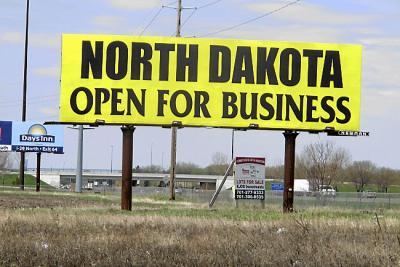Minnesota lawmakers have agreed to a minimum wage increase that would require pay hikes for an estimated 350,000 residents. But how will the policy affect bordering states?
The Greater North Dakota Chamber of Commerce, which recently upset some Minnesota officials with cheeky “North Dakota Is Open For Business” billboards aimed at luring Minnesota businesses west across the border, says the state is poised to take advantage.
“This move by Minnesota again proves that the leadership in Minnesota looks at business as something to tax and regulate, whereas in North Dakota we see business as something that is encouraged in our state, and is the lifeblood to our economy and our citizens’ prosperity,” said Jon Godfread, the group’s vice president for Governmental Affairs. “I think in terms of businesses it shows another reason to relocate to North Dakota.”
Already Moving to North Dakota
Godfread sees a trend in Minnesota businesses moving to North Dakota or expanding their operations there, and he expects that to continue because of the new wage policy.
“There are many companies located in [Minnesota] that are expanding into North Dakota,” he said. “I see that trend continuing especially if the leadership in Minnesota wants to make the contrast between North Dakota and Minnesota so great.”
Godfread said some North Dakota border communities may lose a few employees to Minnesota’s higher minimum wage, but he noted wages have grown rapidly in North Dakota, thanks to a booming economy.
“I doubt we see much change in North Dakota, other than more businesses moving from Minnesota to North Dakota,” he said. “In terms of employees we are paying in many cases above the proposed minimum wage already, that is the market at work. A $15 [per hour] job at a McDonald’s in Bismarck is [a] prime example of the free market at work.”
North Dakota Leads in Income Growth
According to numbers from the federal Bureau of Labor Statistics, North Dakota has led the nation in personal income growth in six of the past seven years, with incomes in the state nearly doubling in the past decade. The state is now third in the nation for personal incomes, behind Connecticut and Washington, D.C.
Here are the minimum wage changes Minnesota lawmakers have agreed to:
- The minimum wage for businesses with gross sales of more than $500,000 would rise to $8 in 2014, $8.50 in 2015 and $9.50 in 2016.
- The minimum wage for businesses with gross sales less than $500,000 would rise to $6.50 in 2014, $7.25 in 2015 and $7.75 by 2016.
- In 2018 the minimum wage will begin increasing with inflation, with a cap at no more than 2.5 percent per year. The governor would have the option to halt the yearly increase.
North Dakota has no state minimum wage. The federal minimum wage is $7.25 per hour.
Rob Port ([email protected]) reports for Watchdog.org, where this article first appeared.




